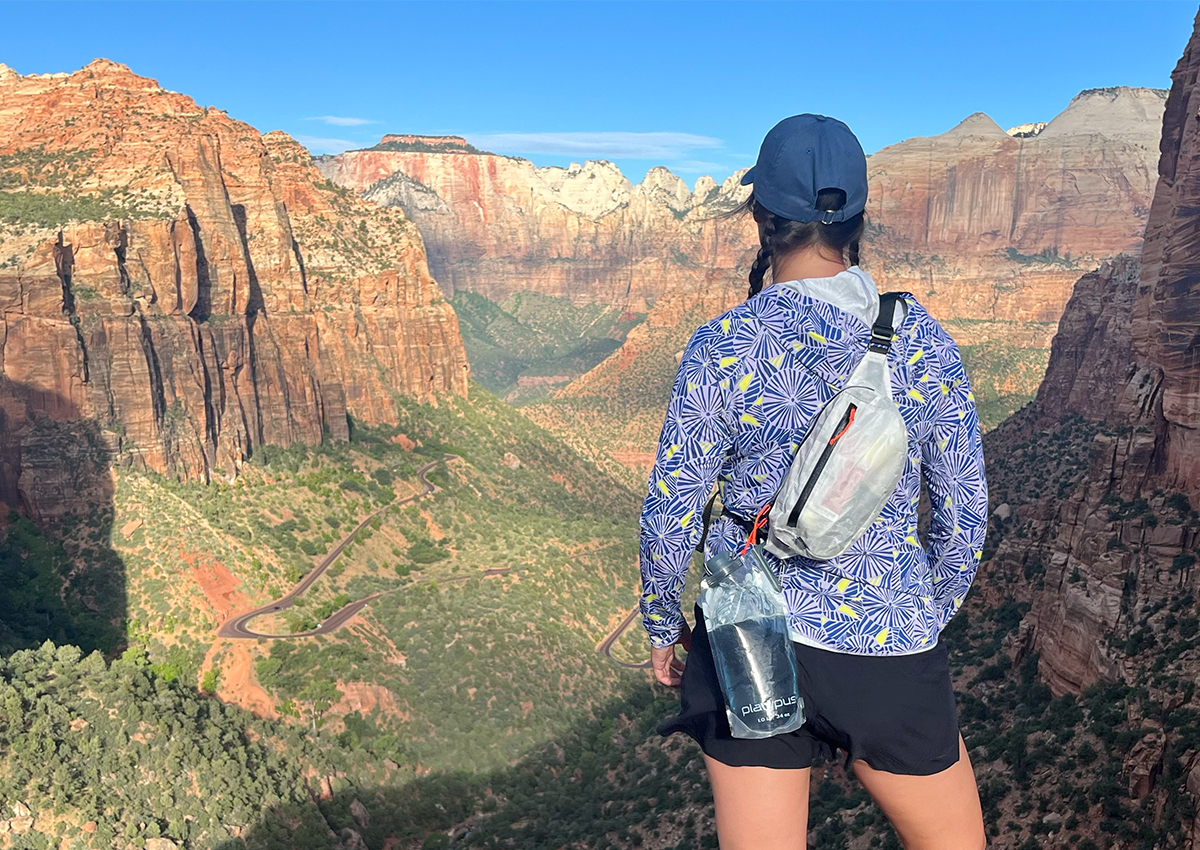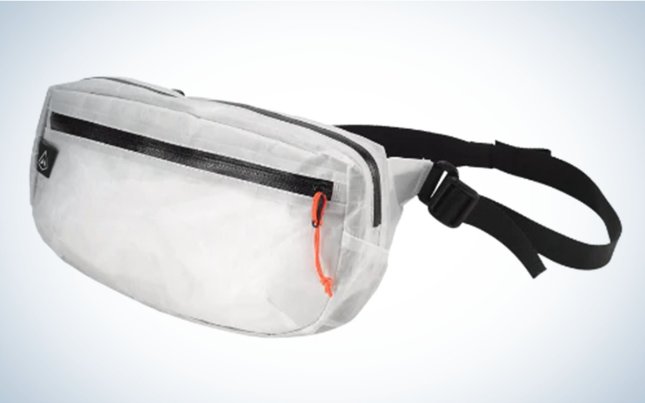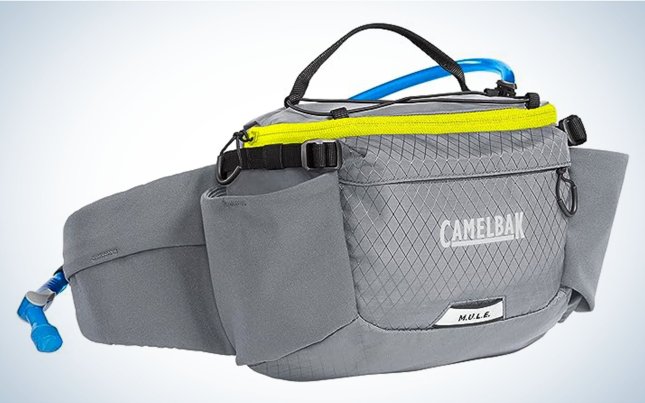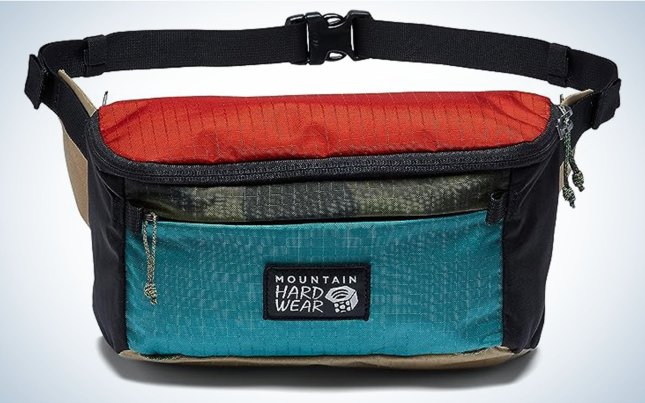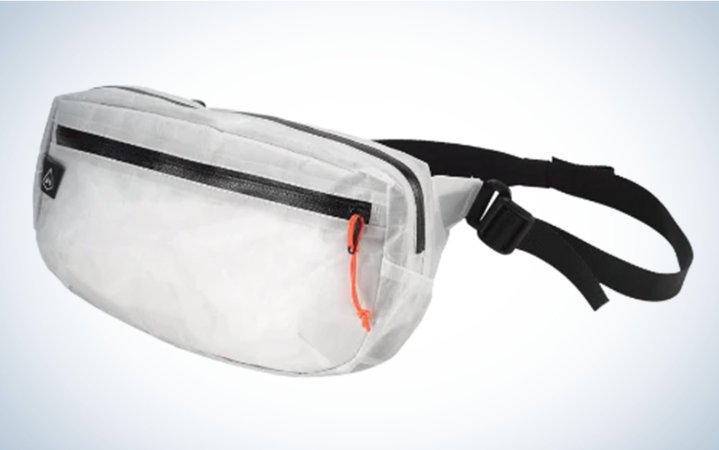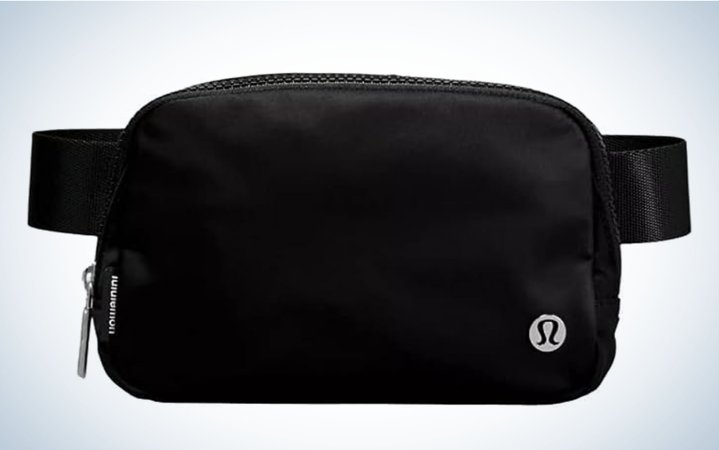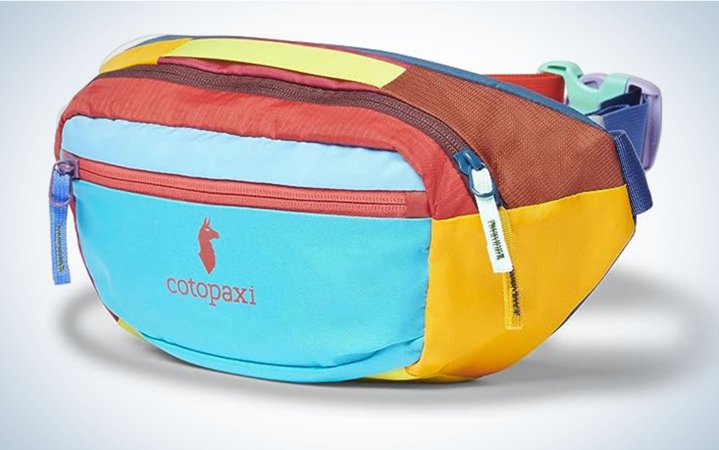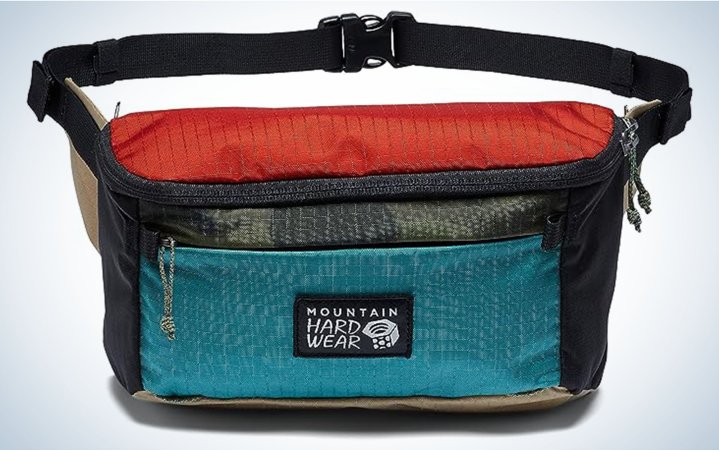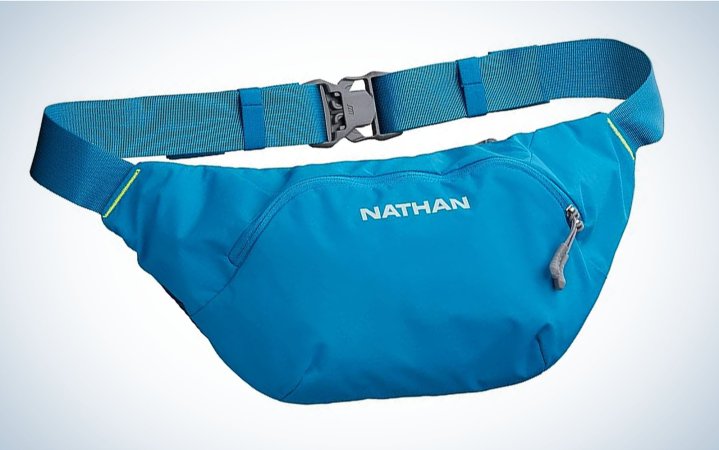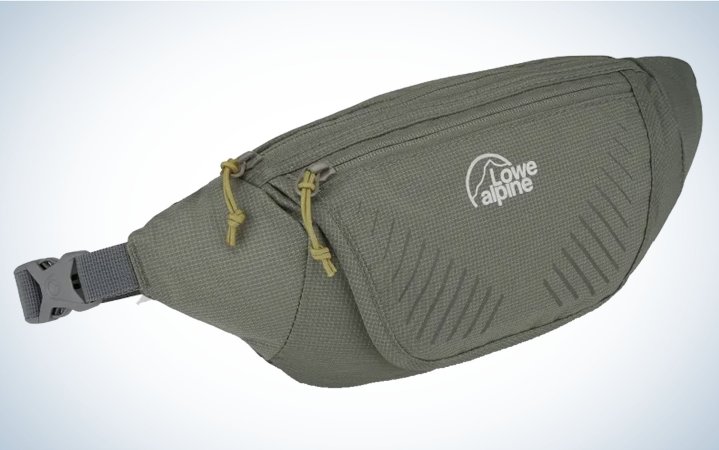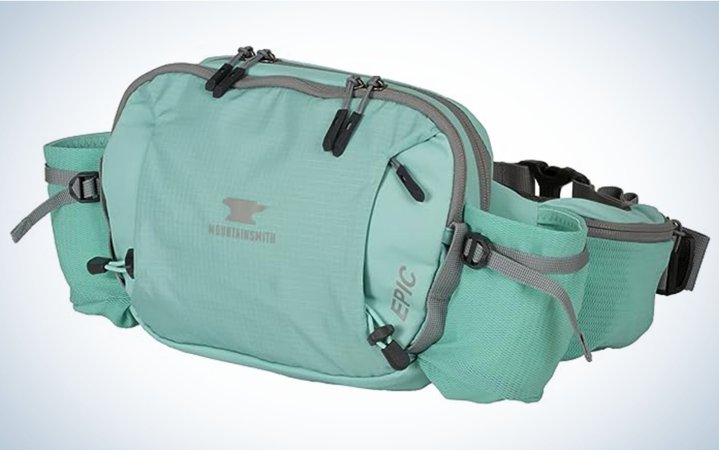We may earn revenue from the products available on this page and participate in affiliate programs. Learn More ›
You may have noticed that fanny packs are everywhere on hiking trails now. These convenient bags are half the size of a daypack and sling over your shoulder or around your waist for easy access to your essentials. The best hiking fanny packs carry enough gear for a day hike or work in conjunction with your backpack for extra storage and organization.
- Best Overall: Hyperlite Versa
- Best Hydration: Camelbak M.U.L.E. 5 Waist Pack
- Best Small Capacity: Lululemon Everywhere Belt Bag 1L
- Best Mid-Capacity: Cotopaxi Kapai 3L
- Best High Volume: Mountain Hardwear Camp 4 Hip Pack
- Best Ultralight: Patagonia Ultralight Black Hole Mini Hip Pack 1L
- Best Budget: Lowe Alpine Belt Pack
- Best for Running: Nathan Limitless 2 Liter Sling
- Mountainsmith Epic
How I Tested the Best Hiking Fanny Packs
I chose a variety of waist packs to test for this article, including lumbar packs and fanny packs. Lumbar packs are designed to sit on the small of your back with the strap resting on your hips for load bearing support. Fanny packs can be worn in a variety of ways: back or front of the waist and back or front of the chest. You can even sling it over your shoulder or, in the Hyperlite Versa’s case, attach it to your backpacking bag’s hip belt or sternum strap.
To test the best hiking fanny packs, I took them on everything from trips ranging a few miles to a 40-mile thru-hike. Some packs survived rocky scrambles and rain storms. If I was able to carry water, I did so using bottles, reservoirs, and soft flasks. I also packed snacks, sunglasses, sunscreen, wallet, keys, and my phone. All of these hiking fanny packs fit comfortably and kept my gear organized.
Best Hiking Fanny Packs: Reviews & Recommendations
Best Overall: Hyperlite Versa
Best Overall
Hyperlite Versa
Key Features
- Belt Size: 35 inches max (measured)
- Weight: 4.27 ounces
- Capacity: 2.5 liters
Pros
- Ultralight
- Removable waist strap
- Open-top stash pocket
Cons
- Straps are a little annoying to adjust

I wore this pack thru-hiking and it forever changed the way I hike. Over a 40-mile trip, I kept essentials like my phone, headphones, pocket knife, bug spray, hand sanitizer, snacks, sunglasses, toothbrush, and toothpaste in this for easy access at my waist in conjunction with my hipbelt. I was able to keep the bug spray in the front zipper pocket so that no leaking DEET could contaminate my toothbrush and snacks. The roomy stash pocket was perfect for pulling my phone out to capture critters on camera or quickly check my map. You can remove the belt if you want to attach it to your hipbelt instead, as the stash pocket features two holes to slide it onto any strap less than 3 inches thick.

If I wanted to explore after dropping my bag at camp, it was large enough to fit the best ultralight sandals and sunscreen or a liter bag of water. It’s only water resistant, not waterproof as there is a gap between the dual zippers, but the lightweight Dyneema hybrid material is waterproof and very durable. I think the white model with orange zippers looks smart, but it is already getting dirty, as expected. It’s hard to care when I can easily spot the bright white in my dim tent when looking for some essential item inside.
Best for Hydration: Camelbak M.U.L.E. 5 Waist Pack
Best for Hydration
Camelbak M.U.L.E. 5 Waist Pack
Key Features
- Belt Size: 28 to 46 inches
- Weight: 1 pound, 2 ounces, 13 ounces (measured) without reservoir
- Capacity: 3.5 liters
Pros
- Reflectivity points
- Air Support back panel
- Includes 1.5 liter reservoir and two exterior water bottle holders
Cons
- Not very roomy for its size
- Magnet doesn’t work very well
The Camelbak M.U.L.E. includes a 1.5 liter reservoir which is ideal for a day hike. This is definitely the most comfortable way to carry water for a short hike. No constricting straps on your shoulders and chest, and the load bearing hipbelt takes the pressure off your back. The Air Support back panel incorporates a lot of cushion that also increases airflow to keep you cooler longer. The hipbelt also incorporates two additional pockets.
While the specially designed horizontal reservoir is super comfortable, getting it set up takes some extra time. The tube only fits through the tiny openings on either side of the lumbar pack one way. The openings aren’t big enough for the nozzle, so you have to thread the bottom in first and plug it into the reservoir inside. Also, the magnetic attachment point on the hose and pack designed to keep the hose contained isn’t very strong and frequently pops loose. I would instead tuck the hose through the waistband. I took this pack on a short summit after work and I’ll continue to bring it on hikes where I only need water, my phone, car keys, and a beer or snack. There isn’t much room for anything else.
Best Small Capacity: Lululemon Everywhere Belt Bag 1L
Key Features
- Belt Size: 41.7 inches max
- Weight: 6.7 ounces
- Capacity: 1 liter
Pros
- Spacious
- Comfortable strap
- Zippered back panel pocket
Cons
- Shows stains
I like that this Lululemon fanny pack is called the Everywhere bag, because that’s exactly where I see it: everywhere. The grocery store, breweries, hiking trails, and the list goes on. So I was excited to see how it performed. I used it around town for a while and I loved the thick, soft, and comfortable strap for wearing across the back, chest, and waist. Then, I took it on a backpacking trip to see how it handled outdoors.

And it was great, if a little heavier than necessary. I enjoyed having a convenient pocket for my phone and snacks. I also like that the back pocket is zippered. While, I left it unzipped most of the time for easy access to my phone, if I was using the Everywhere to explore around camp, I could zip up the phone pocket securely. The cavernous main pocket holds a lot for such a tiny pack. And it unzips over halfway down each side for a wide opening. There are three mesh panels sections inside for organization. My only complaint is that the almost silky, matte fabric shows stains easily; water stains and smudges stick around until they’re wiped off.
Best Mid-Capacity: Cotopaxi Kapai 3L
Best Mid-Capacity
Cotopaxi Kapai 3L
Key Features
- Belt Size: 38 inches max (measured)
- Weight: 7 ounces
- Capacity: 3 liters
Pros
- Padded, fleece-lined sleeve for a phone or sunglasses
- Top grab handle
- Repurposed nylon shell fabric
Cons
- No discrete or stash pocket
The repurposed nylon shell is made of fabric scraps leftover from other Cotopaxi products, meaning each Kapai has unique color blocking. The one-of-a-kind colors and streamlined profile make this one of the most stylish fanny packs I looked at. But it has also stood up to abuse while hiking and feels strong and durable. It has a 3-liter capacity but doesn’t look it. It gives a Mary Poppins effect when you pull numerous items out. I once fit an entire game of Jenga in it.

The top grab handle is super convenient. While hiking, the padded and contoured back panel and wide belt felt comfortable and stayed in place. This mid-capacity hiking fanny pack is a rare and versatile model that I would happily wear with a backpack on a long hike and toss over my shoulder for a short hike.
Best High Volume: Mountain Hardwear Camp 4 Hip Pack
Best High Volume
Mountain Hardwear Camp 4 Hip Pack
Key Features
- Belt Size: 30 to 48 inches
- Weight: 7.4 ounces
- Capacity: 5 liters
Pros
- Straps can be stashed to turn into travel organizer
- Roomy
- Two-way zip main compartment
Cons
- Some color bleeding
What the Camp 4 lacks in extraneous features, it makes up for in sheer space. At 11.5 inches long, you can easily fit one of the best water bottles and more. There are also several loops on the exterior that allow you to clip on any additional gear. You can tuck the belt straps into a flap on the back to create a sleek travel organizer as well. Inside, there’s one divider pocket and a clip for your keys or an Airtag. A smaller zipper pocket is located on the front for slimmer items.

420D carbonate coated nylon makes this a highly durable pack. It withstood plenty of scrambles and brushes with rocks during testing in Zion National Park. This is the best high volume hiking fanny pack because it can easily hold everything you need for a day hike: water bottle, sunscreen, snacks, phone, keys, and wallet. And it fits comfortably and securely across your chest, back, or waist. The neutral color blocking is attractive, but on two models I’ve seen, there is some dye bleeding. It’s purely aesthetic and doesn’t rub off on clothes at all.
Best for Running: Nathan Limitless 2 Liter Sling
Best for Running
Nathan Limitless 2 Liter Sling
Key Features
- Belt Size: 22 to 46 inches
- Weight: 6.54 ounces
- Capacity: 2 liters
Pros
- Back panel water-resistant zippered phone pocket
- Includes 14-ounce soft flask
- Removable bounce-free waist strap
Cons
- Back mesh panel durability concerns
Nathan includes a small water flask in this model, and it has the capacity to hold a Nalgene or Nathan’s 25-ounce soft flask with hose. The interior is very roomy with two compartments in addition to the main pocket. There is also a water-resistant zippered phone pocket on the back panel with a clip for your keys. But where this hiking fanny pack really shines is its bounce-free technology.

The shape is contoured to stay in place and there is a removable waist strap to further secure it when worn across your back or chest. I was highly impressed at its staying power, with no flopping or sliding around while scrambling. After just one wear I did notice a patch of pilling on the edge of the mesh back panel. This panel is designed to be ultra-breathable, so watch where you toss this pack because the mesh doesn’t stand up well to abrasions. The nylon outer shell feels more durable.
Best Budget: Lowe Alpine Belt Pack
Best Budget
Lowe Alpine Belt Pack
Key Features
- Belt Size: 40.5 inches max
- Weight: 3.7 ounces (measured)
- Capacity: 1 liter
Pros
- Soft spacer mesh back panel
- Three zippered compartments
- Lightweight
Cons
- Thin strap
- Plastic strap retainer
At just $25, this fanny pack is great for hiking on a budget. It’s extremely lightweight at just under 4 ounces (Rab’s product specs say 2 pounds, 2 ounces, but I assure you that is incorrect). And it has a soft and breathable mesh back panel. It has a good carrying capacity, but doesn’t feel as roomy as the other 1-liter hiking fanny packs I tested.
The Lowe Alpine belt pack keeps your stuff organized and compressed. The discreet front pocket is convenient and easy to get into. The only drawback to the best budget hiking fanny pack is its strap. It’s thin and not the most comfortable. Along with the minimalist strap is a plastic clip to retain excess strap that isn’t the most functional. I’d prefer an elastic retaining strap like others on this list.
Best Ultralight: Patagonia Ultralight Black Hole Mini Hip Pack 1L
Key Features
- Belt Size: 8 to 36 inches
- Weight: 3.5 ounces
- Capacity: 1 liter
Pros
- Ultralight
- Stuffable
- 100 percent recycled fabric
Cons
- Minimalist
This tiny fanny pack is a great ultralight, minimalist option to use in conjunction with your backpack while hiking or backpacking. It fits your phone, keys, wallet, and hiking sunglasses. It’s roomy for its size, fitting a liter of gear. The Black Hole mini hip pack is made of 100 percent recycled fabric yet still feels strong and durable.
While thin, the straps are soft and comfortable for any carry method. There’s also a small zipper pocket in front for credit cards, ID, etc. I’d recommend this pack to any thru-hiker looking for a smaller, lighter, and stuffable alternative to the best overall fanny pack, the Hyperlite Versa. Like Patagonia’s other Black Hole products, this bag folds and zips into itself for travel or storage.
Mountainsmith Epic
Mountainsmith Epic
Key Features
- Belt Size: 28 to 48 inches
- Weight: 12 ounces
- Capacity: 2.3 liters
Pros
- Two exterior water bottle holders
- Tons of pockets including hipbelt pockets
Cons
- Not the most comfortable back panel
- Disappointing load bearing
This hiking lumbar pack looks large and has a ton of pockets for organizing your stuff. Not only are there two water bottle holders, but there’s also enough room inside for a water bottle. However, the load bearing capacity of the hipbelt was disappointing. I wanted to bring just one water bottle on a hike, but putting it in the side pocket made one side droop distractingly. When I put it inside the pack itself, it pulled at my back uncomfortably.
The back panel only offers a thin block of mesh cushioning but no contouring for air flow or support. The lack of cushioning does mean this pack is pretty roomy, but its capacity is only 2.3 liters for a 10 by 7.5-inch fanny pack. For the size, I’d like more supportive features or more interior storage space. It does feature a secret front zipper pocket, front stash area for an extra layer, and three interior pockets.
Things to Consider Before Buying the Best Hiking Fanny Pack

Lumbar Pack vs. Fanny Pack
Many lumbar packs are designed for cyclists to keep their center of gravity low over a bike. But lumbar packs are a great choice for hikers too. It helps you avoid a sweaty back and if you have tight shoulders or a sore back, a lumbar pack can make you more comfortable. They typically have a capacity for a water reservoir or water bottles and enough space for the bare minimum of gear for a day hike: snacks, an extra layer, a first aid kit, and sunscreen. These are usually too bulky to wear any other way besides sitting on the small of your back with the strap buckled around your waist. They also usually offer more load bearing support.
Fanny packs differ from lumbar packs in that they can be worn a number of ways, such as wrapped around your waist or across your back or chest. Some are small enough to be used in conjunction with a backpack and others have enough room for everything you need for a few hours of hiking. The best fanny packs for hiking should fit comfortably and stay put while walking. The straps are usually more minimalist and lack the hipbelt qualities of a lumbar pack’s straps.
Size
The best hiking fanny packs vary in size. This list includes packs from 1 to 5 liters. Keep in mind what you’re likely to use your fanny pack for the most. If you want enough space for a water bottle, focus on the lumbar packs or more sizable fanny packs. If you want to use your fanny pack along with your backpack, opt for a smaller size so it doesn’t overcome your hipbelt pockets. When hiking with the smaller models, I sometimes clipped a water bottle to the outside which worked well.
Read Next: Best Hydration Packs, Tested and Reviewed
Final Thoughts on the Best Hiking Fanny Packs
It’s obvious that hiking fanny packs are taking over the trails, and for good reason. These bags add another level of organization and convenience on long trips. And if you’re sick of lugging a day pack on every hike, a waist pack is a great minimalist option, especially for summertime hikes when you don’t need as much supplies. But if you’re hiking with just a fanny pack, remember to have a hydration solution!
- Best Overall: Hyperlite Versa
- Best Hydration: Camelbak M.U.L.E. 5 Waist Pack
- Best Small Capacity: Lululemon Everywhere Belt Bag 1L
- Best Mid-Capacity: Cotopaxi Kapai 3L
- Best High Volume: Mountain Hardwear Camp 4 Hip Pack
- Best Ultralight: Patagonia Ultralight Black Hole Mini Hip Pack 1L
- Best Budget: Lowe Alpine Belt Pack
- Best for Running: Nathan Limitless 2 Liter Sling
- Mountainsmith Epic
